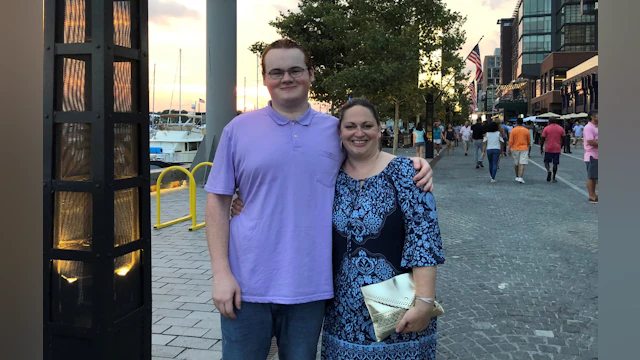Can a young child really have suicidal thoughts? This is a question I’m sometimes asked when I’m presenting educational programs in my role as the Virginia Area Director for the American Foundation for Suicide Prevention. It’s a question I would have been likely to ask, myself, years ago.
I was working late one evening, after I had put my six-year-old son to bed, when he walked back into the room, stood next to my desk, and – in much the same way he might have asked me to fix him a snack -- asked me if I would help him end his life. I spent the next two days working with his pediatrician and a psychiatrist to find an available bed in a psychiatric care facility for such a young child, and I was eventually able to place him for in-patient treatment. So began our journey.
That night will forever replay in my mind. 16 years later, I am incredibly grateful to still have him with me, and I celebrate the fact that my son has grown into a young adult with a kind heart, strong work ethic, and the ability to manage his own treatment. But our reality is that getting to this point has not been easy, and he still experiences episodes of depression.
We didn’t talk about mental health 16 years ago the way we do today. Many of the resources we needed did not exist at that time, and those that did were very difficult to find. We were, as far as my family could tell, alone. We were fortunate to find an amazing therapist when my son was released from the hospital, and we began our journey with education, consistent therapy, and other tools as we worked to build a network of support around him.
Once we had that network of support and a therapist in place, I set out to create space for my son to grow into the challenges that depression and anxiety had brought into his life. I worked to practice healthy coping strategies with him, such as exercising, ripping paper, or yelling into a pillow to release his frustration. I helped him articulate his emotions, and reassured him that his feelings were not a result of anything he had done wrong. I listened when he described not knowing why he felt “different” than other children. I also tried to explain why he was no longer allowed to attend certain group activities or sports practices where parent volunteers were uncomfortable being responsible for his safety. (His depression often manifested as defiance, angry outbursts, and impulsivity.) I took time off from my job to attend weekly therapy sessions, and to meet with school administrators and teachers to keep them informed about his condition and treatment plan.
And I cried in hiding, a lot. I cried out of frustration because I couldn’t help my child be happy, and because I felt sure I had made mistakes along the way. I cried for missed career opportunities because I was consumed with his care. I cried because he and I were often alienated by other parents and families who feared the angry outbursts his depression produced, and for the birthday parties we never held because his social life had fallen sacrifice to his mental health. I felt exhausted in every way, yet my instinct was to keep fighting for him anyway.
Over the years, I sometimes found myself at odds with people and systems who were not equipped to do the difficult work necessary to help him thrive. But I also found love and support in beautiful people along the way, who could see through the symptoms of his condition and brought the best out in him. I found people who not only believed in him, but also went the extra mile to advocate for him. These special case workers, teachers, role models and health care providers are the reason he is doing better today. They saved his life, and I carry each of them in my heart with gratitude.
People have told me on several occasions that my son is fortunate to have me as his mom. Honestly, I believe the opposite is true: I am fortunate to have him as my son. He is the strongest person I know, and has taught me more through his mental health journey than I ever could have learned otherwise. He has taught me the value of unconditional love, acceptance, and perseverance. We celebrated his graduation from high school a few years ago, and he has moved out of my home to reside with another family member as he works toward living on his own. He has a good job where he can enjoy interacting with other people, while still being able to operate independently when he needs space to manage his emotions. When he is not working, he enjoys gaming online with a couple of close friends. His original therapist and psychiatrist both still provide him treatment, but he now makes his own appointments and monitors his own prescriptions. I look forward to having him visit because I am reminded when he is here that he has grown up to be strong, loving, loyal, and kind. I continue to enjoy his incredible sense of humor and quick wit, and I’m grateful that he calls and texts often to ask me how I’m doing, and if I need anything. He is not just my son, he is one of my best friends.
Not every person who experiences suicidal thoughts requires the same level of care. Every person’s journey, and diagnosis, is different. I have always been transparent about our experience because I want other parents to know that they are not alone. I want them to know there are other families who understand. And I want them to keep looking for the beautiful people in their own journey. Above all, I want them to know there is hope.
